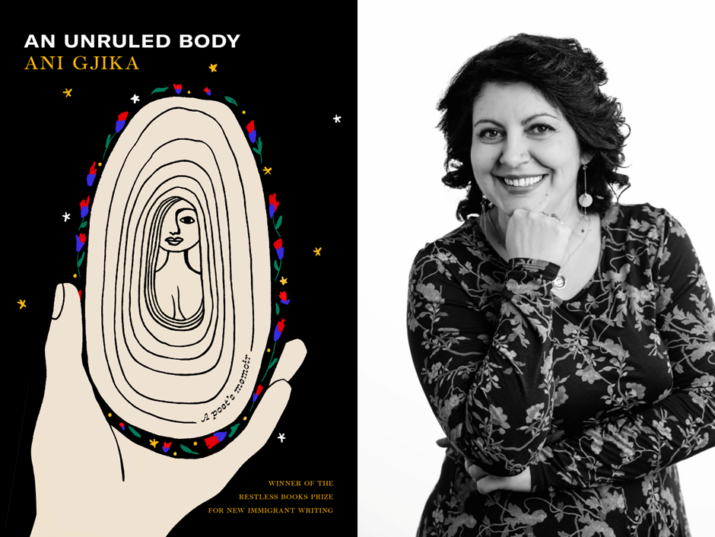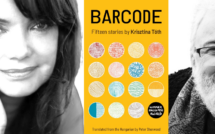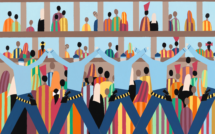

GIRLHOOD
I SIT AT MY DESK trying to remember the last time the teacher called my name, hoping I’m safe for another week or so. I am in the second or third grade. They call us according to where our names fall on the alphabetical roster and my name ensures that I am always one of the first, if not always the first, to be called in front of the whole class. For years, through elementary school, middle, and all of high school, we are told to get up in front of the class and recite the day’s assigned chapter.
I don’t remember when my hands start to sweat, but I remember the day a teacher asks me to get up and recite a history chapter, the subject of which I no longer recall. I stand in front of the class panicking that my classmates will see the sweat building up on my palms. They’re so wet that I can’t think of anything else. What must they be thinking as they watch the little bubbles of water forming on my fingers like condensation on a steamy bathroom mirror?
Drip, drop . . . I’m talking and a drop of sweat, a whole drop, falls to the ground! I can no longer control the sweating or hide it by closing my fists, or putting my hands in my pockets. Another drop. I’m turning into a faucet. They will all see! They will all know what a freak I am. No one will be my friend.
“Sit down, Ani,” says Ms. Bardha, and I am shocked. It’s as though the whole thing was in my head. I get back to my desk and my hands are dry. None of my classmates say anything.
But the anxiety I feel at school is nothing compared to what awaits me outside.
In all the years I walk to and from school, to and from the bread store or mini-market, I walk with my back hunched. I don’t want anyone to notice I have breasts. I keep my eyes to the ground, convinced I will slip by, invisible. It’s becoming more and more common for young women my age to be kidnapped and sold into prostitution. Everyone wants to get rich overnight, and in a patriarchal culture, women are at the bottom of the hierarchical chain. They are currency, given to their men, taken from them. Human trafficking is becoming the new economic normal in post-Soviet Eastern Europe.
In Albania in the nineties, after the fall of a fifty-year-long Communist regime that strips everyone of their identity, men in their twenties and thirties are hungry to align themselves with what they perceive as power. They hang together in packs, harassing girls and women wherever they appear. After decades of isolation, the country is finally opening up to the rest of the world, trying to catch up: Everyone wants cars, groceries, clothes, lots of other goods imported from abroad. The latest jeans, the latest Adidas, the latest sunglasses, the latest BMW, the latest girl who passes through their collective vision. What are girls but objects for men to claim?
THE HALF-LIT CORNER
MY PATERNAL GRANDFATHER, Ligor, who died a few months before I was born, is a big part of the reason my family immigrates to the United States.
It’s 1910. Industrialization is at its peak and America experiences a second wave of immigration, this time predominantly from southern and eastern Europe. At seventeen, Ligor leaves Albania for Italy. From there, he takes a ship to America and lands in Boston. Back home, only his mother, a young widow, remains; he is her only son. Ligor works various jobs in Concord, New Hampshire, but the winters are unbearably cold. Within a year, he and his friends take the train and relocate to Seattle.
I try to imagine this young man who is only a year younger than I will be when I move to Massachusetts. I will throw myself into my studies, wanting to perfect my English as he threw himself into work to send money home to his mother. There he is, on the train to Seattle, a tall, thin Albanian who makes everyone laugh with his endless jokes and stories, his hazel-blue eyes and blond hair everyone talks about, too young to care about his looks, unaware of the lives he has yet to create.
In Seattle, Ligor finds work at a steel factory for the Boeing Company. Years later, raising my father, he will tell him about the large buckets of hot, melted steel he carries daily with both hands from one end of the factory to the other. For decades, my father will keep Ligor’s old leather wrist cuffs that he and the other workers wore while holding those heavy buckets so their wrists wouldn’t snap.
Ligor’s boss likes how hardworking he is and wants to make him his son-in-law. He offers to put him through school, but says that Ligor’s pay will have to decrease. Ligor needs a certain amount of money to send home, so he turns down the offer and works hard for another ten years.
His mother sends letters asking him to come back and marry an Albanian girl. Somehow she arranges this before he meets his fiancée. Ligor plans to go home to get married, and then return to the U.S. with his new bride.
There is a photo of him sitting on a chair with his elbow on a table and his hand to his temple. Daisies in a vase on the table. He wears a clean black suit, white shirt, black leather shoes.
“You know why his hand is up to his temple like this?” my father asks me. He doesn’t wait for me to guess. “The cameraman asked him to put his finger to his temple for the shot. He told him, ‘Think again, Ligor, think twice before leaving this country.’”
In 1920, with a temporary American passport that is valid for one year, Ligor reaches Albania and marries the girl his mother chose for him. Unfortunately, as was happening to so many families at the time, Ligor’s wife falls ill with tuberculosis soon after they marry. She dies within the year. In the process, all the money Ligor had saved in America helps to foot the hospital bills and medical treatments. Meanwhile, his temporary American passport expires.
A year later, he looks for a new wife and goes to see a man he respects. The only thing he has heard about the man’s daughter is that she is seventeen. When my grandfather enters the man’s house, he sees Meropi sitting on a stool on the patio, intent on reattaching the handle of a small coffee pot. He tells my dad this is why he immediately liked her—because she seemed to have the mind to be self-sustaining, trying to fix something rather than throw it away.
Meropi’s father had already been asked for his daughter’s hand by another man, “a filthy rich guy,” as he describes him.
“You have two choices, Meropi,” her father says. “Think carefully and choose wisely.”
Meropi thinks and prays. She has no one else to advise her—her mother passed away when she was nine. Either the rich man who is known to be an alcoholic, or Ligor, who is hardworking, older by ten years, widowed, without any known vices, and mostly broke.
When my father says, “She chose Ligor,” I think I see tears in his eyes.
I like the fact that my grandmother chose for herself even though in 1920s Albania she didn’t have many choices to begin with.
Decades later, after Communism isolates Albania from the rest of the world, whenever Ligor drinks with his closest friends (some of whom he’d known in America), they toast: “May the roads and borders open again.” He never stops wishing to come back, or at least to have his children come here, this country that promises freedom and the pursuit of happiness. Throughout his life, my father hears his father: “Do your best and try to get to America. Whatever you do, go to America.”
CROSSING OVER
As immigrants, neither of my parents are ever offered full-time jobs. They remain locked at thirty-eight or thirty-nine hours a week, at minimum wage, which means they never get full-time benefits.
When I’m in college, one of my mother’s jobs is at a book bindery in town. Her second job is to clean the three-story conference building of the Seventh-day Adventist Church, its offices, hallways, bathrooms, and dining areas, three hours a day and six on weekends. And although my father lives mostly in his head, seemingly aloof, he will often go with my mother to help her finish her second job in half the time.
Sometimes, I walk home from an evening class at the same time that my parents are walking home from work. But their work isn’t over. We live in the English Department of Atlantic Union College where in exchange for looking after the building, we don’t pay rent. It includes a third-story apartment, and when I hear that the couple living in it are graduating, I ask if I can apply to move in with my family.
Once we are accepted, we have rooms to ourselves for the first time in our lives. The apartment comes with a living room, a separate dining room, a kitchen, and a bathroom. A whole other wing of rooms serves as storage for the department. We use it as storage, too, and my brother makes his music room there with his drums, guitars, and his friends.
After all their day’s work, my parents come home to work some more: they clean the six offices, five classrooms, five hallways, three bathrooms, common room, and kitchen. My brother and I sometimes help, all four of us at night, one person sweeping the floors in a classroom upstairs, another taking out trash from an office on the first floor, each of us doing something different at four different corners, the house lit in the middle of the woods, so if anyone looks at it from Main Street two hundred meters away, they can see us moving through those rooms like ballet dancers in a vintage music box.
The building is an old mansion built in 1883, all white on the outside, righteously gaining its pseudonym, the White House, with a wide front- and backyard surrounded by evergreen and pine trees, wood floors on the inside, wood on the walls and ceiling, tall antique leaded glass windows, professors’ offices that look like so many private library rooms in a rich uncle’s mansion. We love this house. In Albania, we had lived with my grandmother, all five of us, in 500 square feet for eighteen years. This is the only time we feel we have a home as a family, and we work in it, certainly my parents do, as if it is something more than our very own. The faculty will often praise my parents’ work to me and to them. They tell us how much the place is flourishing since my family has moved in. My father plants flowers around the house: tulips, roses, bleeding hearts—my mother’s favorite. My mother stitches up parts of a curtain or couch cushions in the common room, taking care that they look good again.
But even here, the brunt of the work falls on my mother’s shoulders. She does all three of her jobs Monday to Friday and six hours on Sundays. My brother and I study. My father studies, too, in the winters. My brother and I are embarrassed of our parents’ work and avoid them if they happen to be walking by in their work clothes when we are out with our friends. Classism starts at home.
At the schools where I teach now, I often stop to talk to the janitors and wish I hadn’t been so embarrassed of my parents who did everything, without complaining, to secure a roof over my head, food on the table, clothes, and time to study. They did their jobs and did them well, even while battling depression. I was performing a role I picked up somewhere between watching Beverly Hills, 90210, Dawson’s Creek, and other TV series and films made in America, one in which it mattered most to be and look cool. I worried those days whether I had enough mascara, mood rings, the right length jean shorts and white tank top, that my hair was finally long. Thinking about how I could have helped my parents juggle several jobs, house chores, and their own health was the last thing on my mind. My goal was to blend in as an American teenager. But the only reason there’s any American in me is because of my parents.
Today, they live in a one-bedroom apartment in an affordable housing community for the elderly. My dad has a small plot in their community garden where he loves to grow vegetables, mint, basil, nettles, and some other things I can’t name. My mother has arthritis in both her knees, which developed within a decade of moving to the U.S. When my mother was crawling under freight trains with me still in her belly, none of us knew she was then practicing how she’d cushion the way my brother and I landed in this country so that we could have dreams to follow.
Ani Gjika was born in Albania and came of age just after the fall of Communism. She is the author and literary translator of eight books and chapbooks of poetry, among them Bread on Running Waters (Fenway Press, 2013), and a finalist for both the 2011 Anthony Hecht Poetry Prize and 2011 May Sarton New Hampshire Book Prize. Gjika moved to the US when she was eighteen, earning a BA in English at Atlantic Union College, an MA in English at Simmons University, and an MFA in poetry at Boston University. Gjika is a recipient of awards and fellowships from the NEA, English PEN, the Robert Pinsky Global Fellowship, the 2019 Pauline Scheer Fellowship through GrubStreet’s Memoir Incubator program, and the Restless Books Prize for New Immigrant Writing. She currently teaches writing, social studies, and literature to English language learners at Framingham High School in Massachusetts.
This excerpt from AN UNRULED BODY was published by permission of Restless Books. Copyright @ Ani Gjika, 2023.
Published on April 15, 2024.




